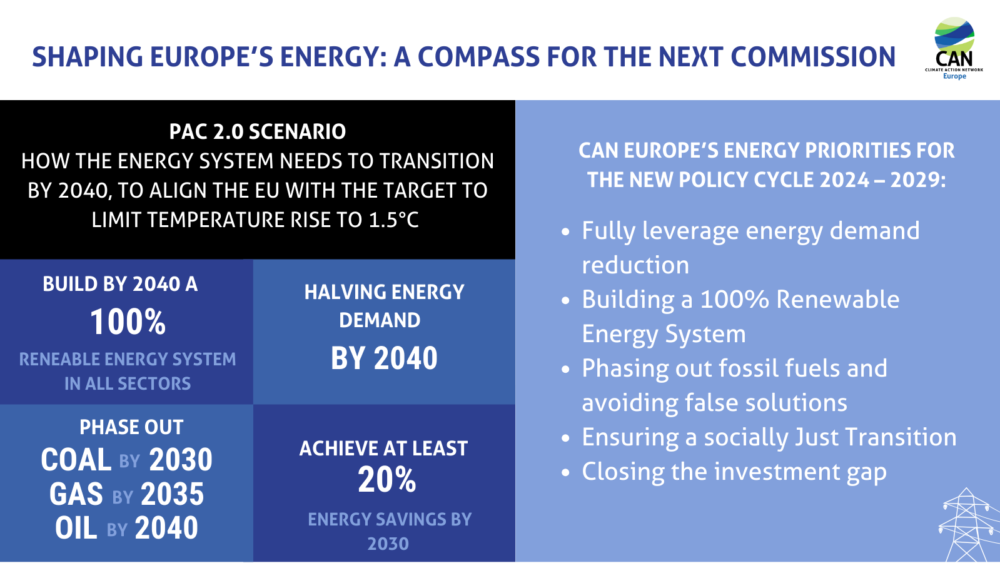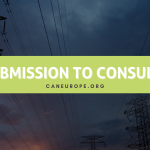In a policy conference in Brussels on September 26, 2024, CAN Europe debated the future of EU energy policy with high level speakers and stakeholders from the EU institutions, member state governments, business and civil society.
Highlights included the launch of CAN Europe’s Paris Agreement-Compatible (PAC) 2.0 energy scenario, which shows a technical, political and societal pathway for the EU’s energy sector to transition towards climate neutrality by 2040. It also aims to ensure that we are planning and building the infrastructure necessary for a future fossil-free, 100% renewables-based energy system.
The conference then discussed how to make an ambitious and just energy transition a reality. CAN Europe’s Energy Compass with concrete policy recommendations for the 2024-2029 EU policy cycle emphasises the need for steep energy demand reduction, upscaling of renewable infrastructure deployment and fossil fuel phase out but also emphasising how the transition can be made socially just and how the investment gap can be addressed.
Keynote speaker Sven Giegold, Secretary of State at Germany’s Federal Ministry for Economic Affairs and Climate Action used his address to the conference to outline the energy policy priorities of the EU’s largest economy. Amongst other things, he called for acceleration of renewables deployment, and implementation of the 2030 energy framework while setting a reliable framework for 2040. You can find Sven Giegold’s full speech here.
🗣️@sven_giegold: “Only a strong focus on #RES can make Europe competitive. No EU funds should be used for new #nuclear”. Priorities for the #CleanIndustrialDeal: EU 2040 RES target & investment for 1400 GW of RES, Infrastructure Acceleration FW, 2040 EE framework & EU energy… pic.twitter.com/jxccPYC2g2
— CAN EUROPE (@CANEurope) September 26, 2024
Sven Giegold’s priorities for the new Commission echo the key points of CAN Europe’s newly published Paris Agreement-Compatible (PAC) 2.0 scenario.
The main findings of this energy scenario include:
- Achieving climate neutrality by 2040 pays off. The PAC 2.0 scenario outlines a clear pathway for the EU27 to achieve climate neutrality by 2040, which is 10 years ahead of the 2050 target. This accelerated timeline will generate significant socio-economic benefits. For every euro invested, the EU will gain up to four times more in co-benefits, amounting to over €1 trillion by 2030.
- A 100% Renewable Energy System is feasible and essential. The transition to a 100% renewable energy system is not only technologically viable but instrumental for limiting global temperature increase to 1.5°C. This includes rapid decarbonization of all sectors, phasing out fossil fuels and nuclear by 2040, and massive investments in solar, wind, storage, and grid infrastructure, for a far more flexible energy system than we have today.
- Energy Demand Reduction is the foundation for climate neutrality. The PAC 2.0 scenario underscores that achieving climate neutrality by 2040 hinges on a substantial reduction in energy demand across all sectors. Through sustainable lifestyles, energy efficiency, innovation and circularity, the EU could reduce its final energy consumption by more than 40% by 2040 (compared to the PRIMES 2020 Reference scenario projections), ensuring that the transition to a 100% renewable energy system is both achievable and cost-effective.

The first discussion panel of the conference was devoted to the topic of a socially just energy transition.
Belgium’s energy minister Tinne Van der Straeten emphasised the vital role that energy communities play in providing affordable and clean electricity. She raised the expectation to remove barriers to energy communities in a future Citizens Energy Package to accelerate their growth. A Citizens Energy Package has recently been announced in the mission letter for the Commissioner-designate for Energy, Dan Jørgensen.
Van der Straeten’s point was echoed by Tadhg O’Briain, Deputy Head of Unit for for Consumers, Local Initiatives and Just Transition, Directorate-General for Energy who said that it is vital to have an action plan for energy communities. O’Briain explained that the aim of such a plan should be to build consumer confidence and scale up technical and financial support for active citizens.
MEP Nicolás González Casares of the Progressive Alliance of Socialists and Democrats said: “The Green Deal is still alive and it would be the biggest mistake of the EU to make it fall.” Casares underlined the need to defend the Just Transition and to support citizens with adapted competition and state aid rules.
Dorthe Nielsen, Director of Strategic Engagement, Institute for Climate Economics, I4CE pointed out that the new Commission should focus on clear investment plans, also on the national level, to make sure thet the just transition measures include actors such as public infrastructure managers and low- and medium-income households.
Adrian Hiel, Head of Campaigns and Media, Energy Cities stressed the role of local heating and cooling plans in the energy transition. He said that the fact that Europe lacks skilled people and funds to renovate homes “is fundamentally unserious.”
During the second panel, speakers presented their stands on how achieving a 100% renewables-based energy system by 2040 should look like.
Walburga Hemetsberger, CEO at SolarPower Europe drew attention to the fact that the RES scale-up will considerably lower the electricity prices for consumers.
🗣️@SolarWalburga: “In the first 100 days of the new Commission, we need taxes that won’t incentivise the #fossil industry. We need a flexibility revolution – scaling up heat pumps, storage, electric cars. It will bring electricity prices down.#EnergyCompass#PACscenario pic.twitter.com/4tdf2VUlm0
— CAN EUROPE (@CANEurope) September 26, 2024
Paula Rey Garcia of the Directorate-General for Energy added that it is also flexibility & storage that have a great potential of reducing energy prices, but Europe needs a comprehensive approach to harnessing all the benefits of a RES system. She also emphasized that no advancement will be done without smooth implementation of already existing and new solutions.
MEP Martin Hojsík of Renew Europe Group underlined, in turn, that the accelerated energy transition needs social support. He said that “winning people’s hearts” is crucial if EU wants to see results of its policies.
Chiara Martinelli, the Director of CAN Europe, said: “Limiting the energy demand is the core of our PAC scenario to limit temperature rise to 1.5C. This should be the top priority for the first 100 days of the new Commission. Second priority should be to grant a socially just transition for citizens.”
To sum up, the conference “Shaping Europe’s Energy: A Compass for the Next Commission” provided solid food for thought for decision-makers and gave clear directions to follow during this new 5-years cycle. CAN Europe thanks all speakers and participants for their input and hopes that discussions on how to achieve climate neutrality by 2040 will be continued.
Read:



